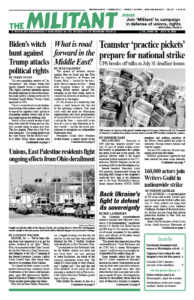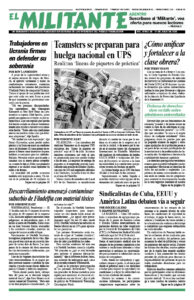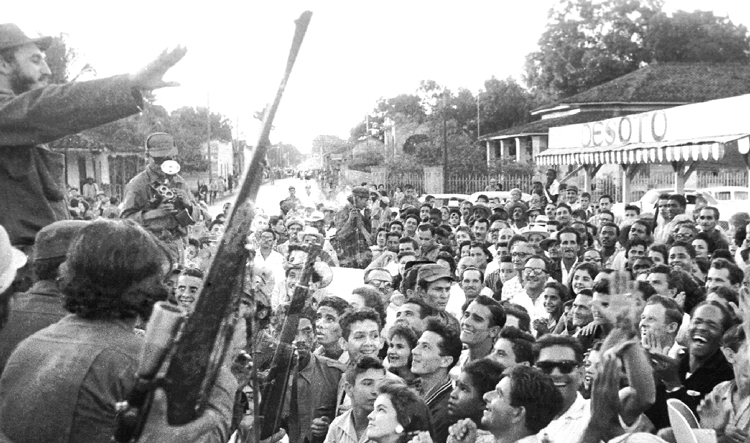One of Pathfinder’s Books of the Month for July is Soldier of the Cuban Revolution: From the Cane Fields of Oriente to General of the Revolutionary Armed Forces by Luis Alfonso Zayas. This year is the 70th anniversary of the Fidel Castro-led July 26, 1953, raid on the Moncada Barracks, launching the modern Cuban revolutionary movement. Zayas joined Castro’s Rebel Army as a teenager. In 1959, the revolutionary war culminated in a successful popular uprising. Castro led Cuban workers and farmers to take power into their own hands, leading to the first socialist revolution in the Americas. It has withstood Washington’s threats and relentless economic war ever since. Mary-Alice Waters, a leader of the Socialist Workers Party, conducted the interview. Copyright© 2011 by Pathfinder Press. Reprinted by permission.
MARY-ALICE WATERS: Did you leave Santa Clara for Havana with Che [Guevara] on January 1?
LUIS ALFONSO ZAYAS: No. Che had me stay to help organize the column. By then it was very large, with almost two thousand combatants, and it had to be taken to Havana. Che went on ahead with a group that included his escort of Antonio Núñez Jiménez, Oscar Fernández Mell, Harry Villegas, Leonardo Tamayo, Alberto Castellanos, and others. On January 2, they took over the La Cabaña fortress, which dominates the entrance to Havana harbor. We arrived at 3:00 a.m. on January 3.
As soon as Che occupied the garrison at La Cabaña, he put all the soldiers and officers of Batista’s army quartered there on leave for a month. The soldiers’ weapons were to be left behind, as well as all other state property. They left with just the clothes on their backs and a few personal items. The officers were allowed to keep their revolvers. A month later, when they came back from leave, they learned they’d all been discharged from the armed forces.
Che put me in charge of the military prison at La Cabaña. Running a jail was something I knew absolutely nothing about.
There weren’t many prisoners at first, but they quickly started to arrive. On January 1, in response to Fidel’s call for a general strike and a popular insurrection, police stations and garrisons all across the country had been taken, and in the days that followed many of the regime’s henchmen were captured. I’m talking about the ones who didn’t escape with Batista — the ones who had to pay for their crimes. From all directions, at all hours of the day and night, patrol cars began to arrive at La Cabaña. In the end, more than a thousand of these thugs and murderers had been turned over.
They included Hernando Hernández, the head of the national police, as well as Jesús Sosa Blanco, Merob Sosa, Pelayo Alayón, and Pedro Morejón. There was also Ricardo José Grau, a general related to former Cuban president Grau San Martín, and other officers of the navy, the police, and the army. Ernesto de la Fe, Batista’s mafia-style information minister, was brought in. There were all kinds of people who had committed every type of atrocity.
One of the most notorious criminals captured and tried was Jesús Sosa Blanco. This was a man who had set fire to houses with families inside. So many victims demanded to testify against Sosa Blanco that the trial was held in the Ciudad Deportiva stadium. It was open to the public and televised.
WATERS: In the United States and elsewhere at that time, a campaign attacking these trials as violations of human rights began immediately. The charge was that the revolution simply executed its enemies without due process.
ZAYAS: All kinds of accusations were made by enemies of the revolution. But no one was executed without having a trial with all established guarantees.
Charges were brought against these criminals by the victims of their outrages, including some whose families had been murdered. Torture victims came to testify: “This man tortured me. See the scar on my back from the beatings.” Or “That man tore out my fingernails.” Some victims had had their eyes gouged out.
As prison chief at La Cabaña, I attended the trials of these murderers. I was also on the tribunal that judged Alayón and Morejón.
WATERS: In the book Cien horas con Fidel [One Hundred Hours With Fidel or My Life in English], journalist Ignacio Ramonet asks Fidel about these trials. Fidel’s answer was very good. Some mistakes were made in the way a few of the trials were conducted, Fidel said — mistakes the revolutionary leadership rapidly corrected. But the revolutionary tribunals, he explained, were established precisely to prevent the criminals from being dragged through the streets by angry mobs and executed without due process. The truth is the opposite of what Washington charged. The revolutionary tribunals brought order and the rule of law.
ZAYAS: Had these individuals been released, they would have been lynched in the street. We had to protect them from the population. The people wanted justice for the deaths of their family members, their loved ones.
This may have been the only revolution in which the main war criminals were tried and brought to justice, the only revolution that didn’t rob or steal, didn’t drag people through the streets, didn’t take revenge, didn’t take justice into its own hands. No one was ever lynched here. Not that some people wouldn’t have liked to. Because the crimes committed by Batista’s thugs and henchmen, those people who thought they could get away with anything, had been horrible. And if there were no lynchings, no bloodbaths it was because of our insistence and our promise: “War criminals will be brought to justice and punished, as examples.”
— FIDEL CASTRO, MY LIFE, 2006


